July 7, 2025

This article highlights the crucial updates to BCBA CEU requirements for compliance in 2025, mandating the completion of 32 CEUs every two years, with designated allocations for ethics and supervision. It underscores the implications of recent changes, notably the removal of DEI coursework and the broadened ethics category to encompass cultural responsiveness. These developments necessitate that behavior analysts reassess and adapt their professional development strategies to align with these new standards.
The landscape of continuing education for Board Certified Behavior Analysts (BCBAs) is experiencing substantial changes as new requirements emerge for 2025. With the demand for BCBAs expected to surge, it is imperative for professionals to grasp the essential updates to CEU compliance. Understanding these updates is crucial for those aiming to advance their careers while upholding their certification.
How will these changes—such as the removal of DEI coursework and the broadened categories for ethics—affect the approach BCBAs take toward their professional development? This article explores the key updates that every BCBA must navigate to effectively adapt to the evolving landscape of continuing education.
Did you know that the demand for Board Certified Behavior Analysts (BCBAs) is projected to surge by 25% by 2026? In this rapidly growing field, Hire ABA stands out as a dedicated recruitment platform that connects BCBAs with top job opportunities in Applied Behavior Analysis therapy. This surge in demand highlights the critical role that Hire ABA plays in helping candidates secure suitable positions while also fulfilling the BCBA CEU requirements essential for compliance.
By integrating job placement with BCBA CEU adherence, Hire ABA is vital for behavior analysts looking to elevate their careers in a dynamic environment. The platform streamlines the hiring process, significantly enhancing the experience for both job seekers and employers. It facilitates a seamless alignment of qualified professionals with opportunities that match their expertise. For instance, recent placements have demonstrated how Hire ABA effectively connects behavior analysts with positions that help meet their BCBA CEU requirements.
Are you facing challenges in your hiring process? Explore how Hire ABA can assist you in advancing your BCBA career. Submit your resume today and take the first step towards a fulfilling career in Applied Behavior Analysis.
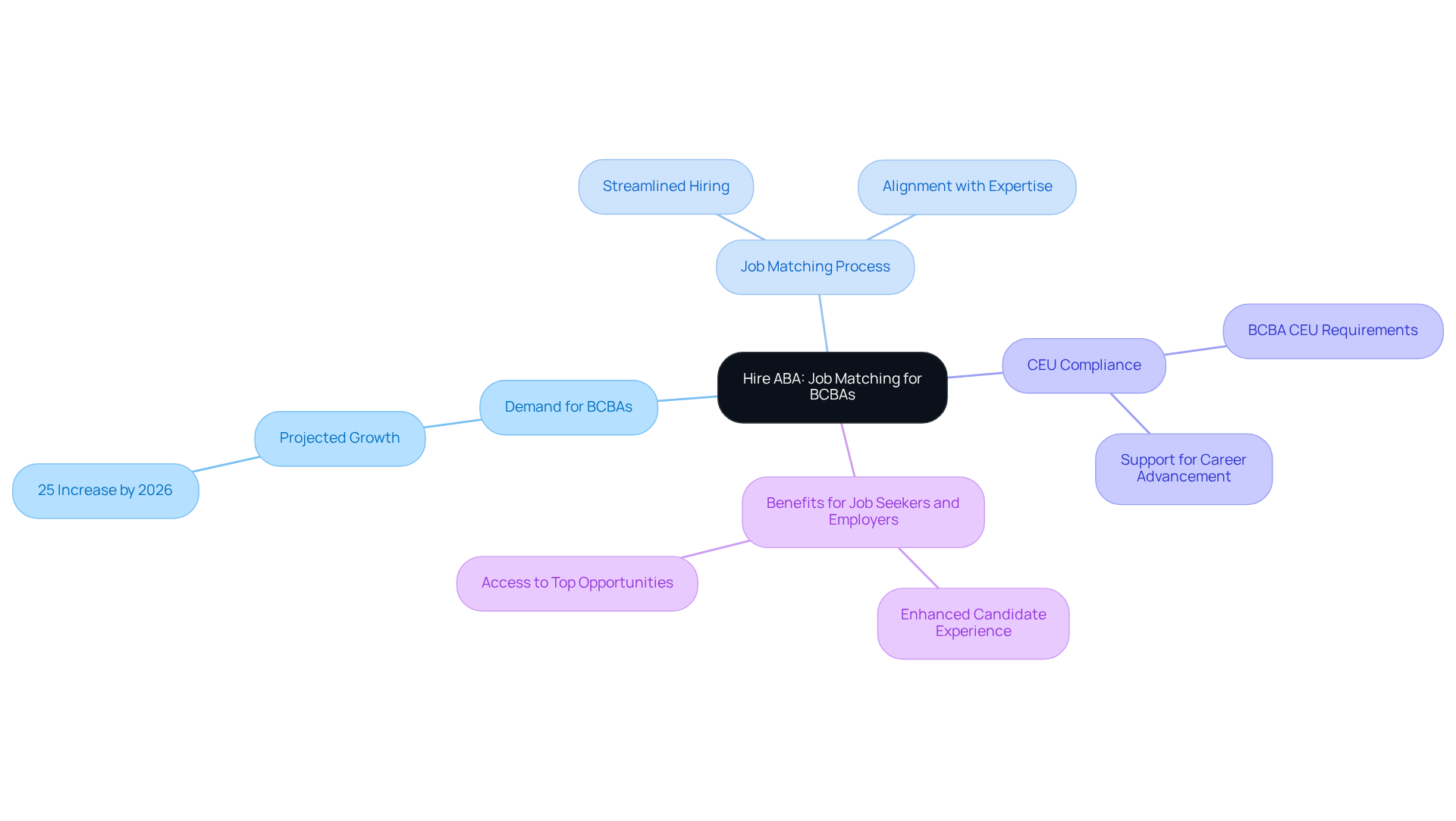
In 2025, Board Certified Behavior Analysts (BCBAs) will be required to complete a total of 32 BCBA CEU credits within a two-year cycle. This requirement includes:
Notably, the Behavior Analyst Certification Board (BACB) has revised its guidelines to highlight cultural and contextual responsiveness within the ethics category, while also eliminating the Diversity, Equity, and Inclusion (DEI) content stipulation. This change underscores the necessity for behavior analysts to effectively engage with diverse populations, reflecting a broader commitment to ethical practice in an increasingly multicultural society.
On average, behavior analysts obtain only around 20 continuing education units before renewal, revealing the challenges they face in meeting these requirements. Consequently, behavior analysts are adapting to these new regulations, ensuring compliance while enhancing their professional competencies. According to the BACB, 'Every two years, Board Certified Behavior Analysts must complete 32 bcba ceu to maintain certification,' which underscores the importance of continual learning in this advancing field.
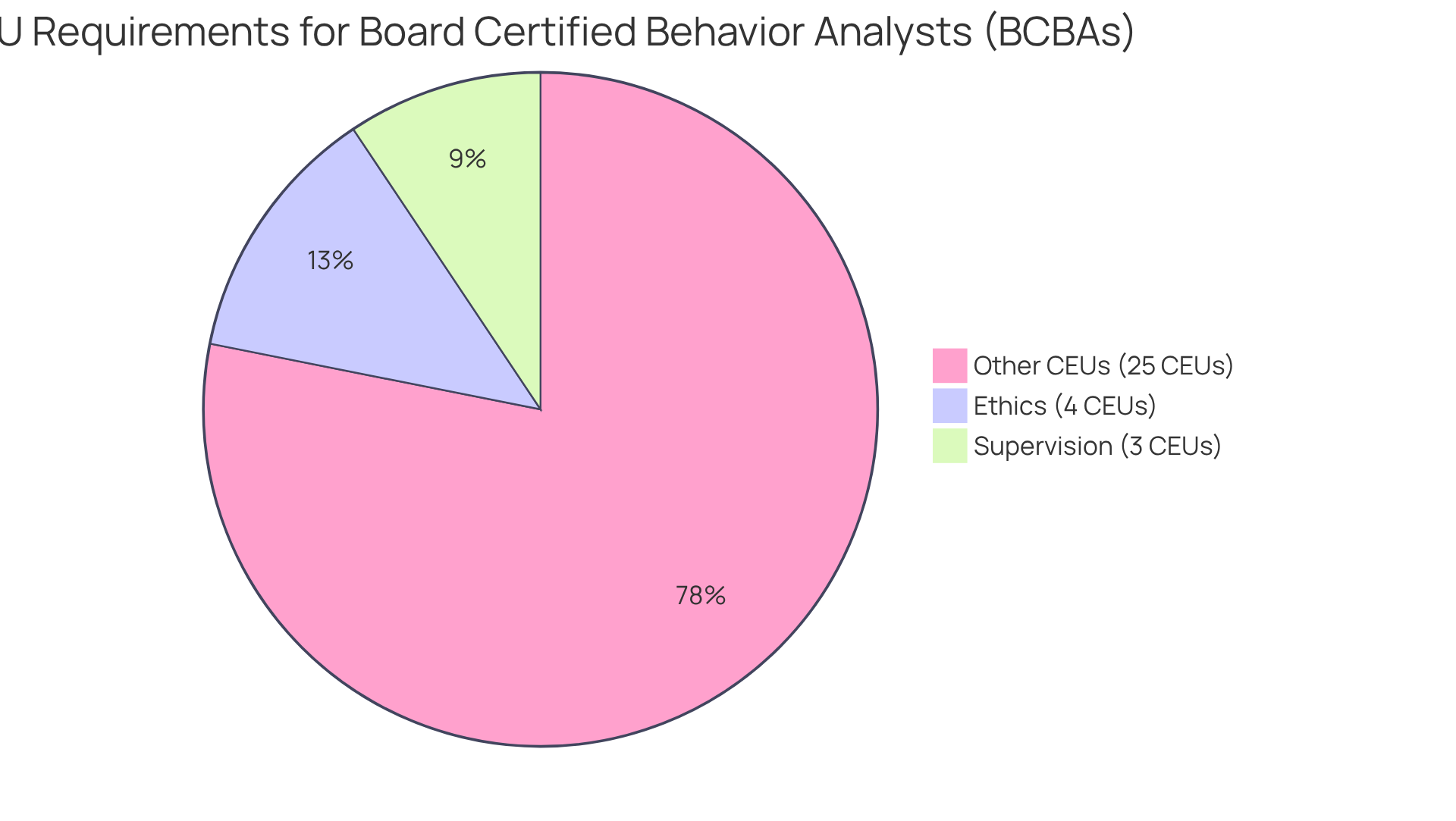
The recent decision by the BACB to eliminate DEI coursework from BCBA CEU requirements for board-certified behavior analysts has ignited significant discussion within the ABA community. This change removes the obligation for behavior analysts to complete specific DEI-related CEUs, potentially limiting their engagement in crucial conversations surrounding diversity and inclusion in their practice. Consequently, many Board Certified Behavior Analysts are now seeking BCBA CEU training opportunities to uphold their cultural competence and responsiveness when working with diverse populations.
Statistics reveal that in 2021, a total of 12,107 BCBA candidates were tested for the first time, with a passing rate of 60%. This statistic underscores the considerable number of BCBA training programs that previously integrated DEI content, highlighting the field's dedication to promoting inclusive practices. With the removal of these criteria, behavior analysts may need to proactively pursue BCBA CEU workshops, seminars, or online courses that focus on cultural sensitivity and the unique challenges faced by marginalized clients. For example, organizations like ILABA are committed to providing DEI-related training and conferences, which could serve as invaluable resources for behavior analysts.
This transition emphasizes the necessity of continuous professional development to ensure that behavior analysts are prepared to effectively serve all communities. Advocacy groups such as BABA have voiced their disappointment regarding the BACB's decision, contending that it undermines years of progress aimed at fostering a more inclusive and diverse field. Critics caution that without explicit DEI training, behavior analysts may struggle to grasp the challenges encountered by marginalized clients, potentially perpetuating systemic inequalities within the field.
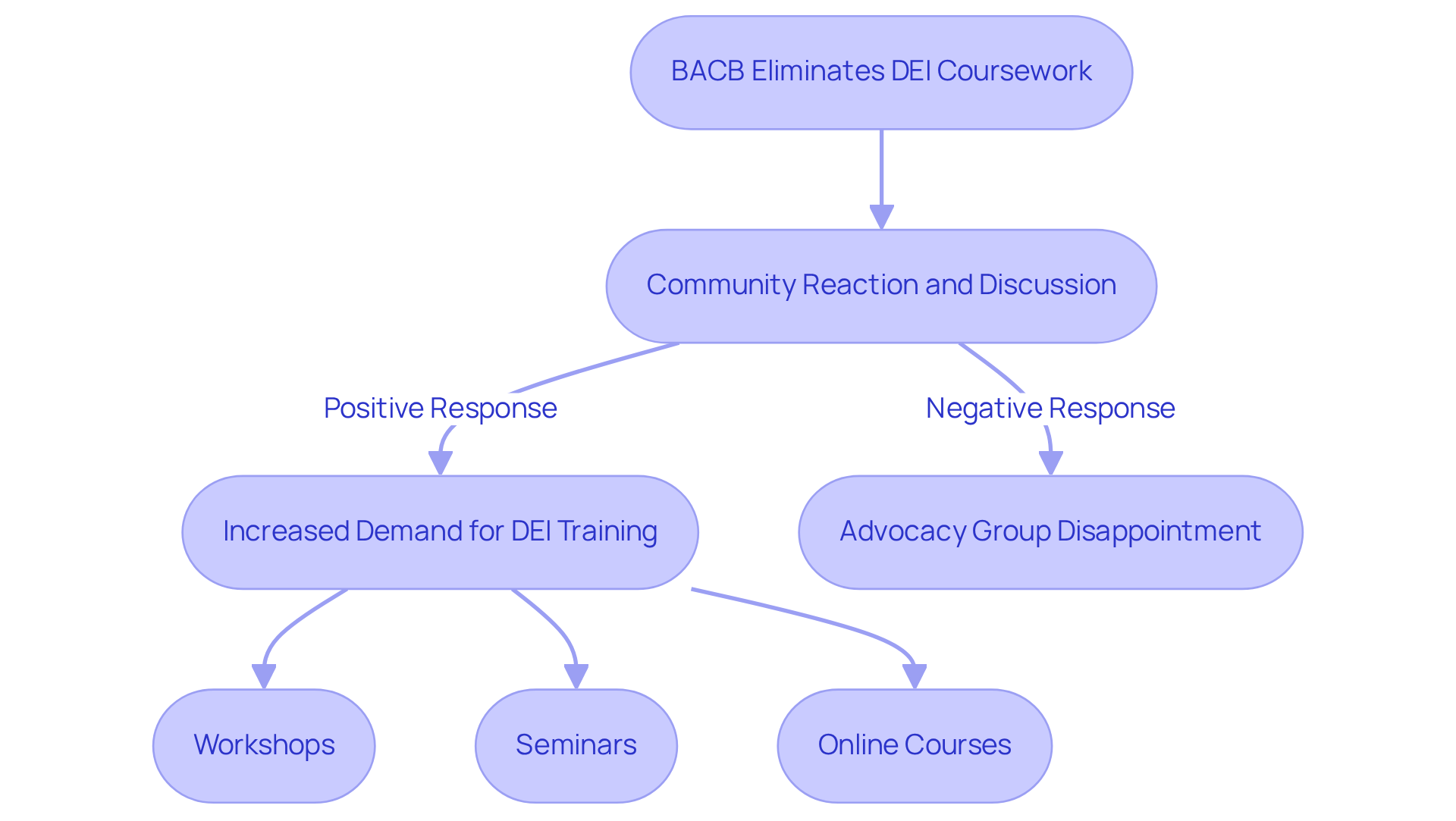
The ethics CEU category has been expanded to include content on cultural and contextual responsiveness. This pivotal change underscores the necessity of understanding the diverse backgrounds of clients and the ethical considerations that emerge in practice.
Board Certified Behavior Analysts are strongly encouraged to pursue classes that not only fulfill the BCBA CEU criteria but also enhance their understanding of ethical practices within a multicultural framework.
This shift signifies a broader commitment to ethical standards in the field of behavior analysis.
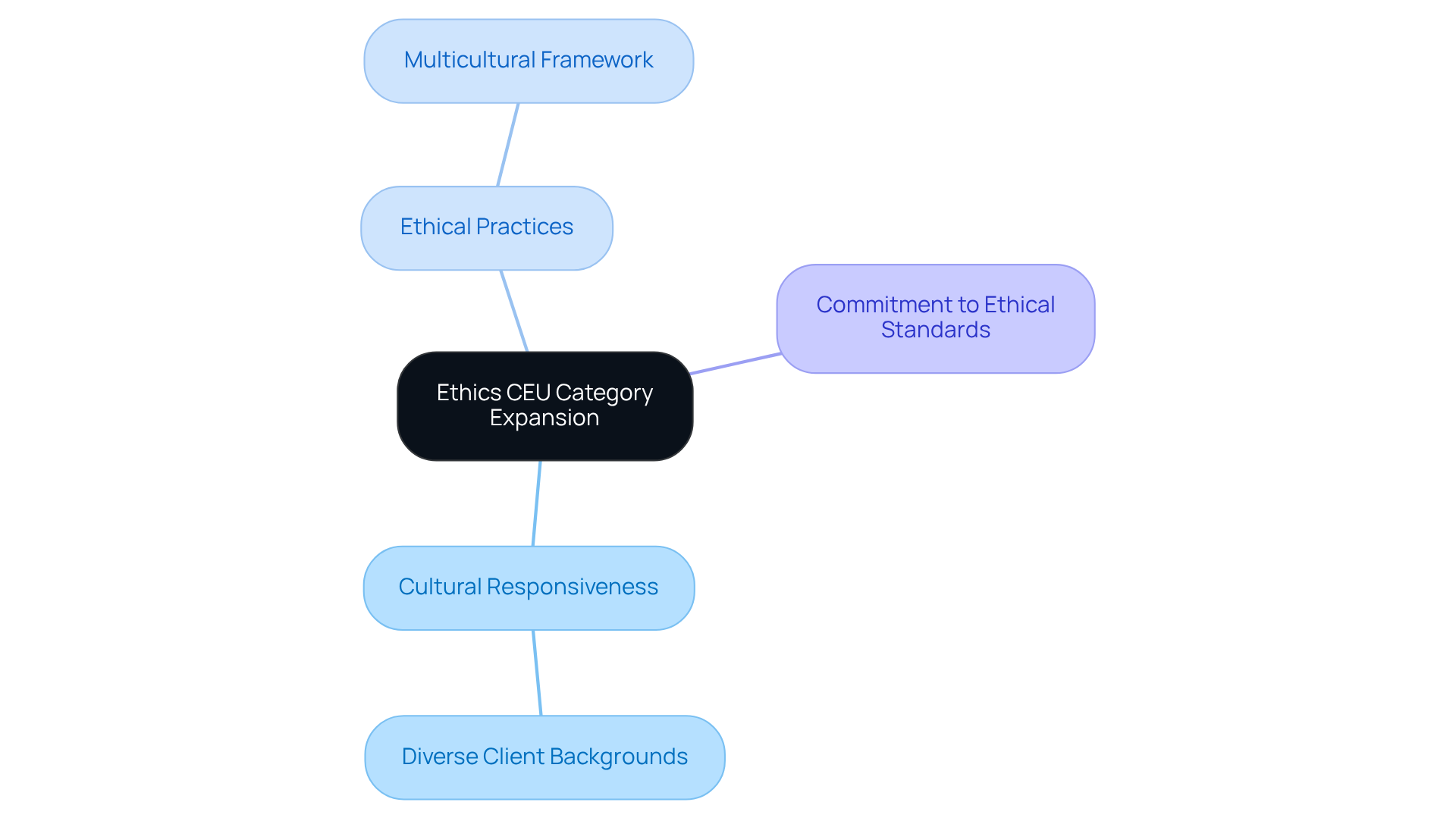
The new CEU requirements will take effect on January 1, 2025. Behavior analysts must ensure that they complete the necessary BCBA CEUs by the end of their certification cycle to maintain their status. Have you considered the implications of these changes for your practice?
It is advisable for behavior analysts to start planning their BCBA CEUs early in the cycle to avoid last-minute scrambles. Monitoring BCBA CEU completion and ensuring that the courses correspond with the updated standards will be vital for compliance.
Take action now to secure your standing in the field.
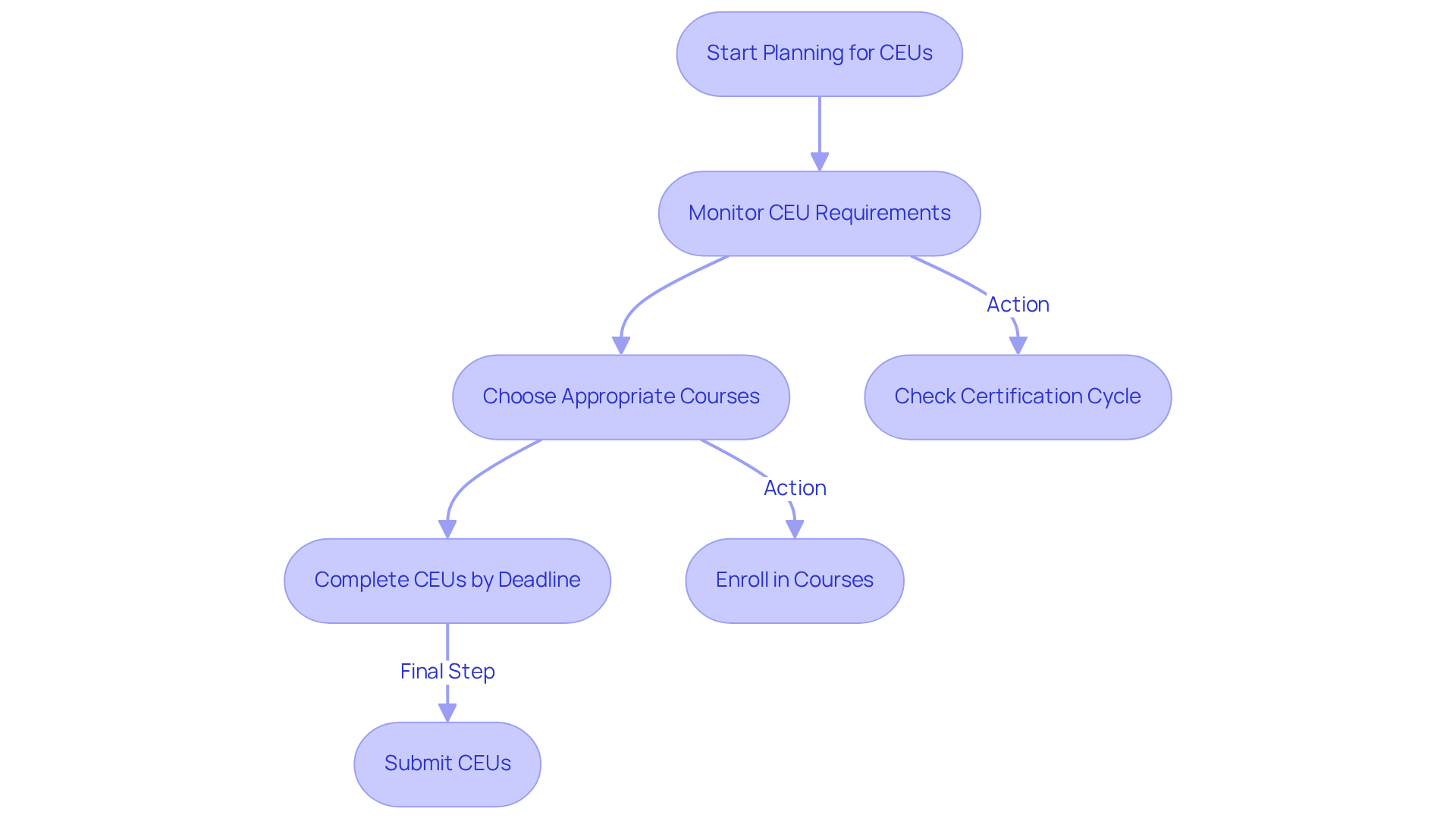
When selecting BCBA CEU providers, Board Certified Behavior Analysts must prioritize those accredited by the BACB. This choice is not merely a recommendation; it is essential for ensuring compliance with the revised BCBA CEU standards. Confirming that the available courses are relevant and deliver high-quality content is crucial.
Furthermore, behavior analysts should reflect on the course format—whether online or in-person—and choose providers that offer engaging and interactive learning experiences. Have you considered how the format impacts your learning?
Additionally, reading reviews and seeking recommendations from peers can significantly aid in making informed decisions about CEU providers.
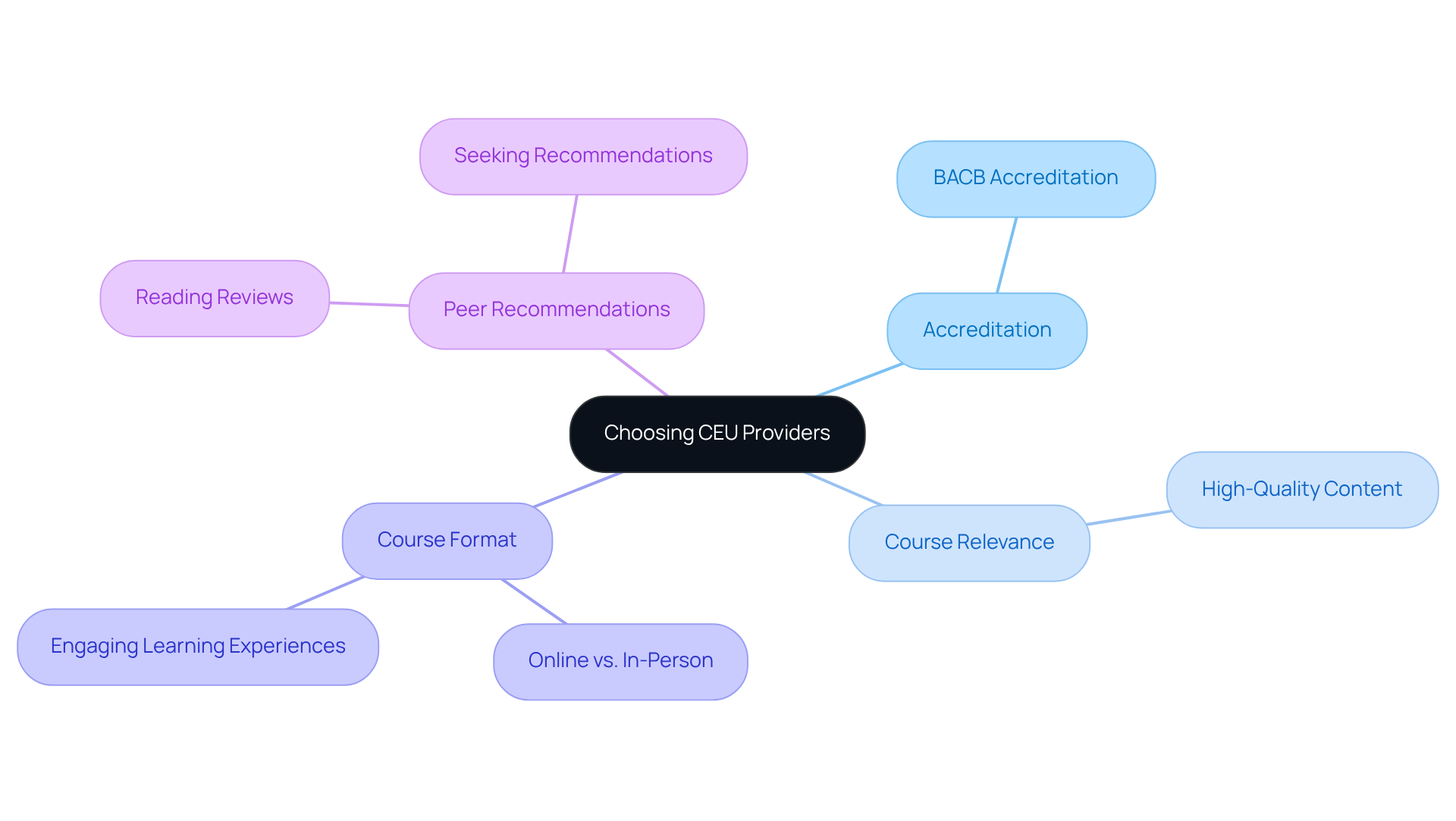
To adapt effectively to the new standards, behavior analysts must first examine the revised BCBA CEU guidelines issued by the BACB. Developing a personalized BCBA CEU plan that clearly outlines the necessary courses is essential for staying organized. Additionally, behavior analysts should establish reminders for course completion deadlines and maintain meticulous records of their continuing education units to be well-prepared for potential audits. Engaging with professional networks and communities not only provides crucial support but also offers valuable resources for navigating these significant changes.
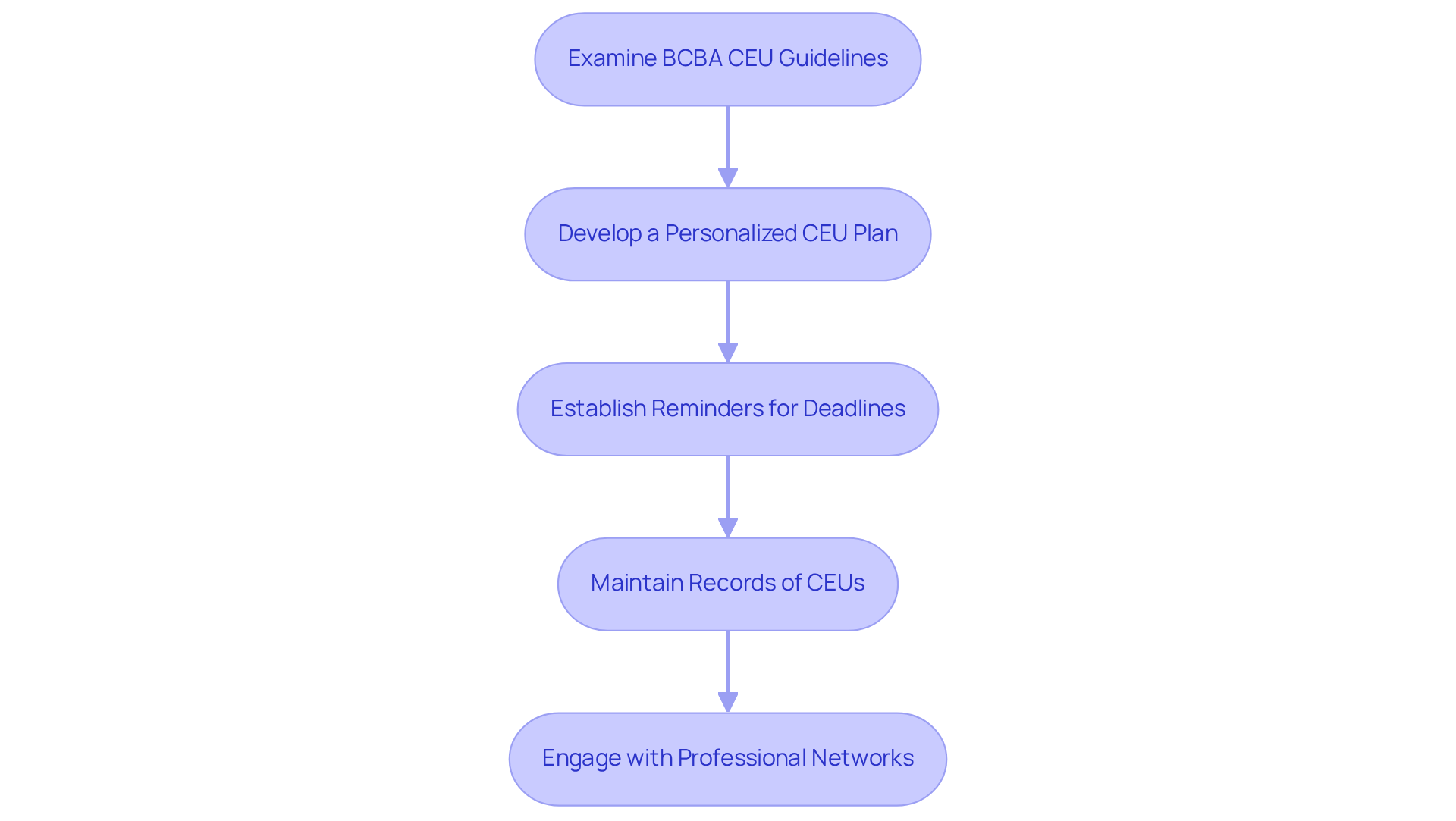
Board Certified Behavior Analysts (BCBAs) are required to complete 32 BCBA CEUs every two years to maintain their certification. This requirement includes specific guidelines pertaining to ethics and oversight.
It is essential for behavior analysts to regularly monitor their BCBA CEU progress, ensuring compliance with the necessary criteria within the established timeframe. By remaining vigilant about these requirements, behavior analysts can prevent lapses in certification and foster continuous professional development.
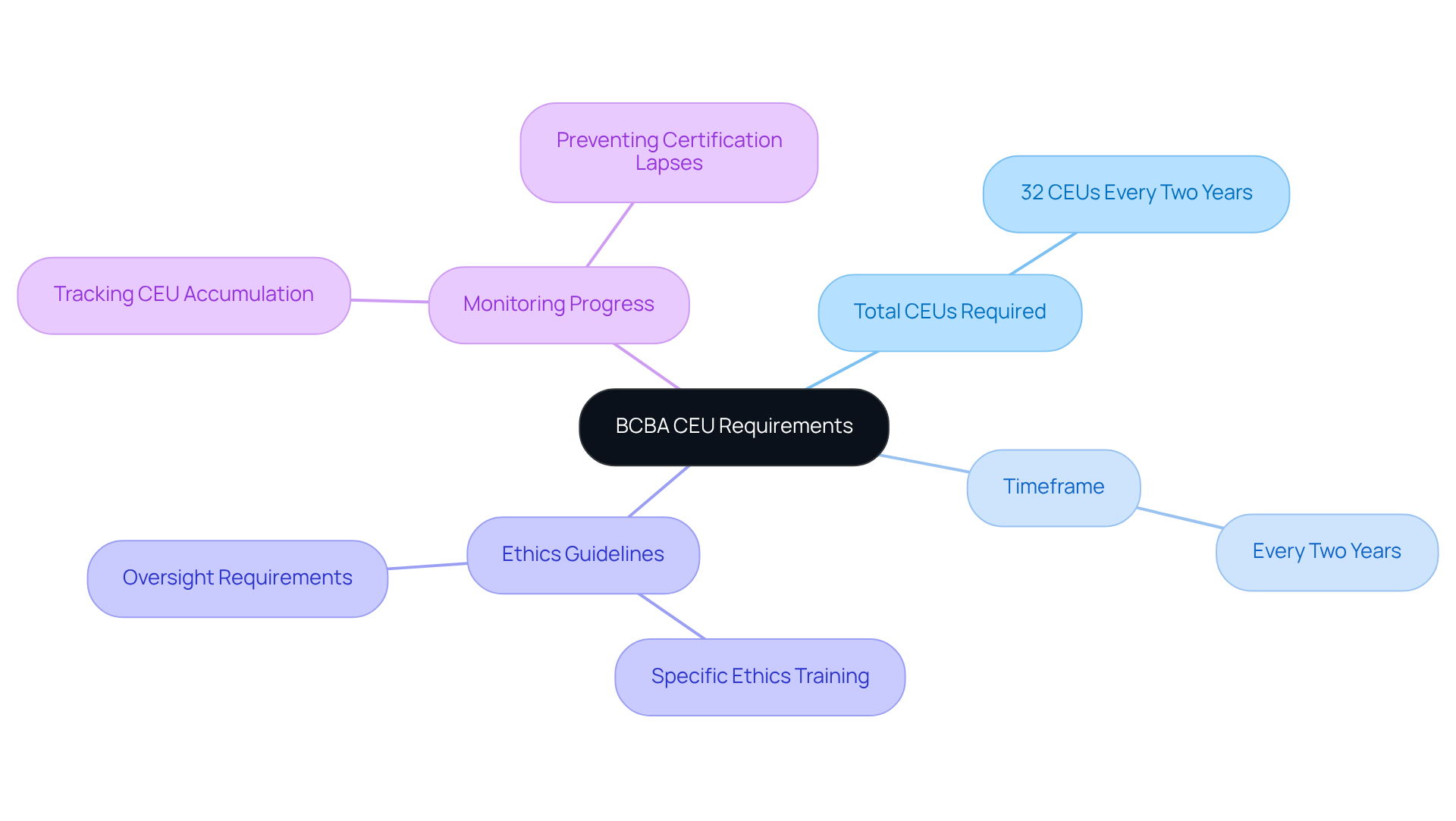
Behavior analysts can significantly enhance their professional development by obtaining BCBA CEUs through various avenues. These include:
Additionally, behavior analysts who oversee trainees or Registered Behavior Technicians (RBTs) can earn CEUs through supervision-related training.
It is crucial for board-certified behavior analysts to select opportunities for BCBA CEUs that align with their professional interests and the updated criteria. This strategic selection ensures they are not only meeting requirements but also optimizing their learning experience. By focusing on relevant and impactful CEU options, behavior analysts can further their expertise and enhance their practice.
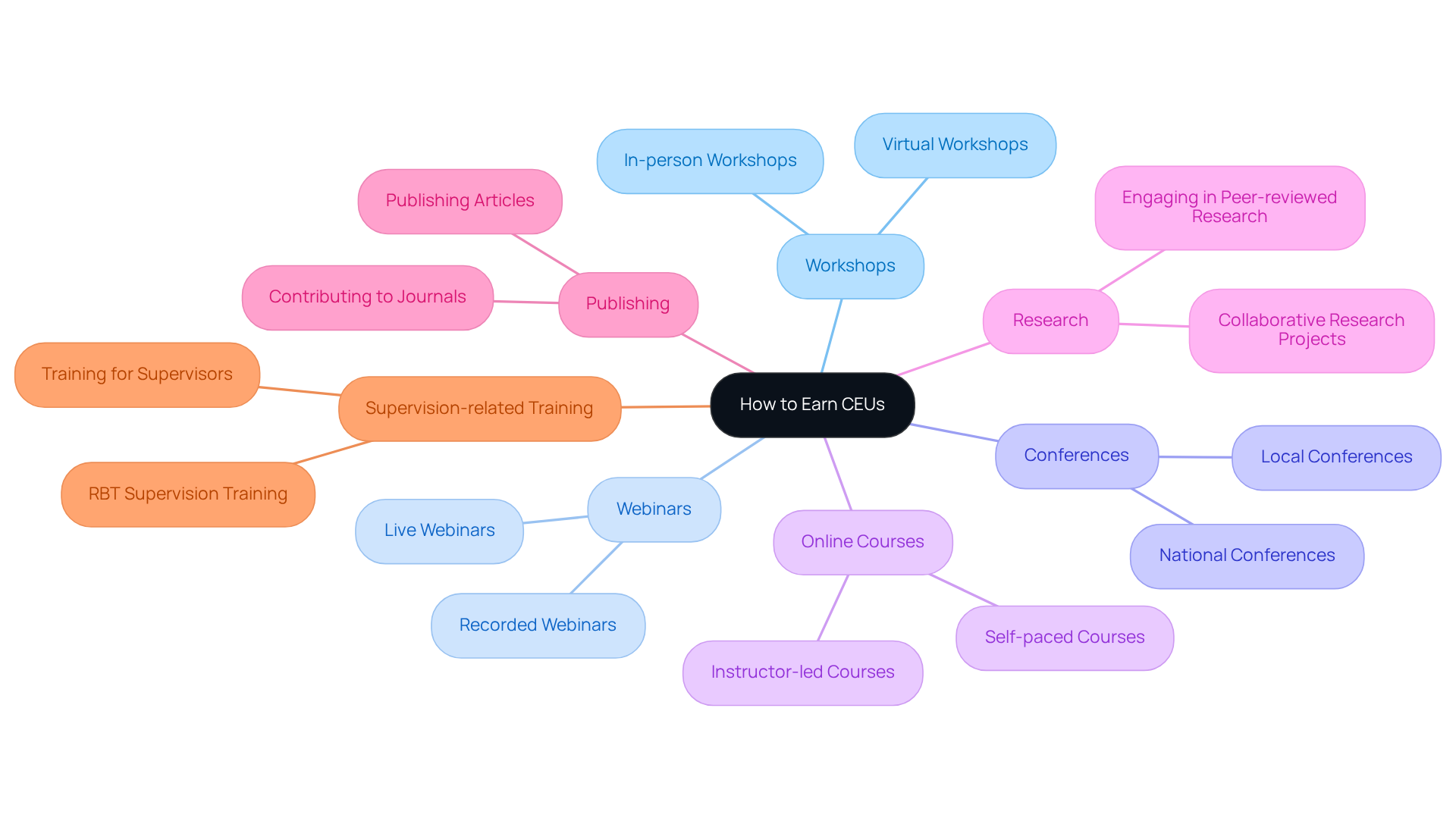
Remaining in accordance with CEU standards is crucial for board-certified behavior analysts to uphold their certification and professional credibility, particularly through BCBA CEU requirements. Did you know that non-compliance can lead to severe penalties, including the loss of certification? This can significantly impact a BCBA's career.
By prioritizing ongoing education and obtaining BCBA CEU while staying informed about the latest requirements, BCBAs can ensure they remain competitive in the field and continue to provide high-quality services to their clients. Compliance not only enhances individual practice but also contributes to the overall integrity of the ABA profession.
Take action now to safeguard your career and uphold the standards of excellence in our field.
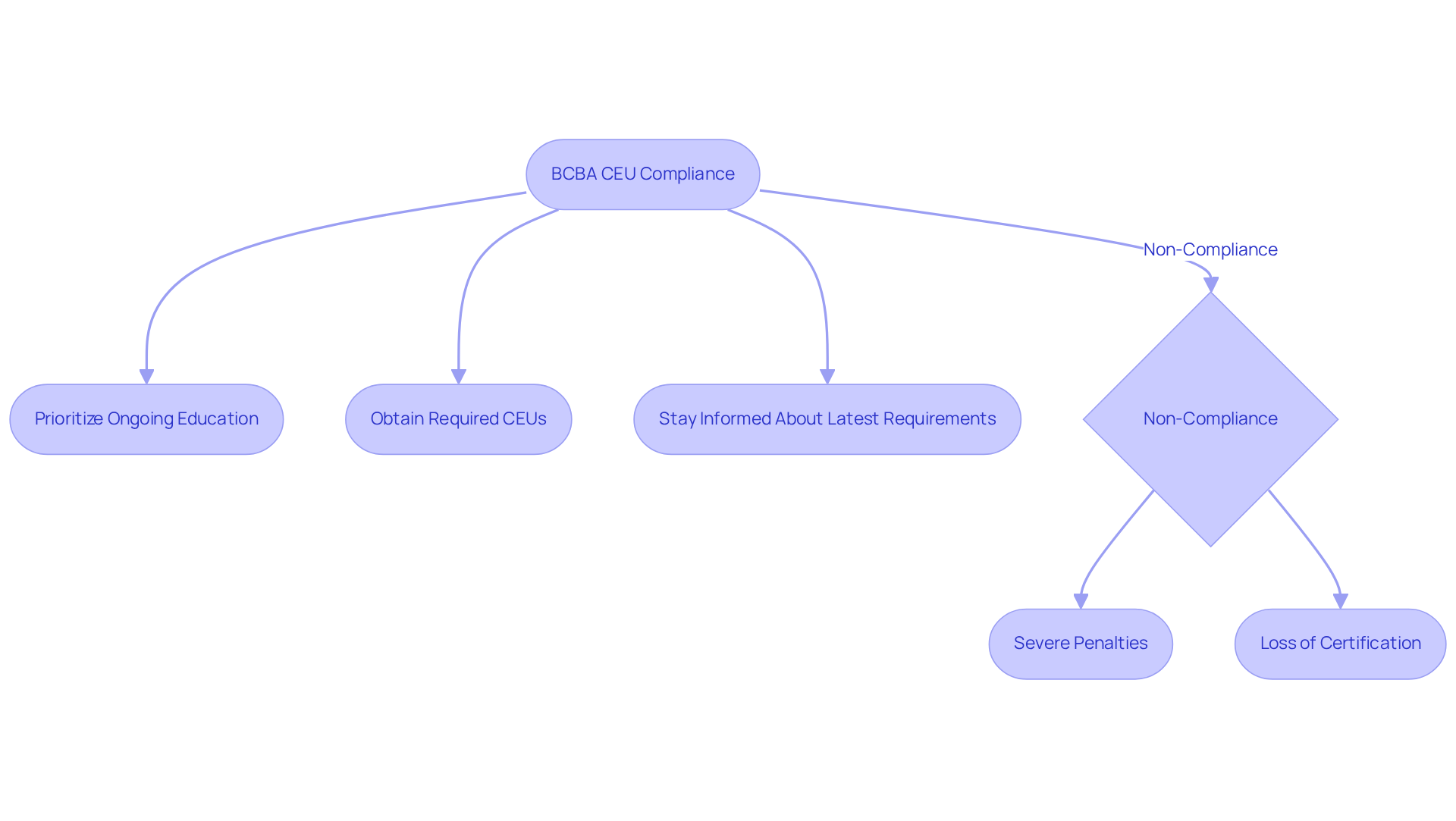
The evolving landscape of BCBA CEU requirements for 2025 presents both challenges and opportunities for Board Certified Behavior Analysts. As the demand for qualified professionals in Applied Behavior Analysis continues to grow, understanding and adapting to these updates is essential for maintaining certification and enhancing professional practice.
Key changes include:
These changes underscore the necessity for BCBAs to engage in continuous professional development. By proactively seeking training that aligns with these new standards, behavior analysts can ensure compliance while enriching their skills and cultural competence.
Staying informed about the 2025 BCBA CEU updates is crucial, not just for individual careers, but for the integrity of the ABA profession as a whole. As the field evolves, embracing these changes and prioritizing ongoing education will empower BCBAs to provide high-quality services and uphold the ethical standards fundamental to their practice. Taking action now will pave the way for a successful and fulfilling career in behavior analysis.
What is Hire ABA and its role for BCBAs?
Hire ABA is a dedicated recruitment platform that connects Board Certified Behavior Analysts (BCBAs) with job opportunities in Applied Behavior Analysis therapy. It helps candidates secure positions while ensuring they meet BCBA Continuing Education Unit (CEU) requirements for compliance.
What are the projected job market trends for BCBAs?
The demand for BCBAs is projected to surge by 25% by 2026, highlighting the growing need for qualified professionals in this field.
What are the new CEU requirements for BCBAs starting in 2025?
Starting in 2025, BCBAs will be required to complete a total of 32 CEU credits within a two-year cycle, including a minimum of 4 CEUs focused on ethics and 3 CEUs in supervision for those overseeing trainees or Registered Behavior Technicians (RBTs).
What changes have been made to the ethics CEU requirements for BCBAs?
The Behavior Analyst Certification Board (BACB) has revised its guidelines to emphasize cultural and contextual responsiveness within the ethics category and has eliminated the specific requirement for Diversity, Equity, and Inclusion (DEI) content.
How do the changes in CEU requirements impact behavior analysts?
The changes may limit behavior analysts' engagement in discussions surrounding diversity and inclusion, prompting them to seek additional training opportunities to maintain cultural competence and responsiveness when working with diverse populations.
What was the passing rate for first-time BCBA candidates tested in 2021?
In 2021, the passing rate for first-time BCBA candidates was 60%, indicating the number of candidates who succeeded in their training programs.
What concerns have been raised regarding the elimination of DEI coursework?
Advocacy groups have expressed disappointment over the BACB's decision to eliminate DEI coursework, arguing that it undermines progress in promoting inclusivity and may hinder behavior analysts' understanding of challenges faced by marginalized clients.
What should behavior analysts do to ensure they are prepared to serve diverse communities?
Behavior analysts are encouraged to proactively pursue BCBA CEU workshops, seminars, or online courses that focus on cultural sensitivity and the unique challenges of marginalized clients to maintain their professional development.
Our expert recruitment strategies and AI-driven sourcing ensure that you receive top-notch candidates quickly, without compromising on quality. Whether you’re looking for BCBAs, Clinical Directors, or RBTs, we’ve got you covered.